Is there a “Your Mom” joke in there somewhere?Where do IDF soldiers go when they... shhhhhh, shut the fuck up.
Iranically Iran, Middle East’s Karen…
- Thread starter Ron in Regina
- Start date
You are using an out of date browser. It may not display this or other websites correctly.
You should upgrade or use an alternative browser.
You should upgrade or use an alternative browser.
Iran's President to Trump: I will not negotiate, 'do whatever the hell you want' — Reuters
President Masoud Pezeshkian said Iran would not negotiate with the U.S. while being threatened, telling President Donald Trump to "do whatever the hell you want", Iranian state media reported on Tuesday.
Is that what Putin told him to do? Iran armed the snot out of the Caspian. Why?
Iran's President to Trump: I will not negotiate, 'do whatever the hell you want' — Reuters
President Masoud Pezeshkian said Iran would not negotiate with the U.S. while being threatened, telling President Donald Trump to "do whatever the hell you want", Iranian state media reported on Tuesday.apple.news
Is that what Putin told him to do?Is that what Putin told him to do?
Why did Iran arm the snot out of the Caspian?Iran armed the snot out of the Caspian. Why?
2 fronts. When Israel hands over all the humus to Trump to repay what they owe for aid youll find out.Is that what Putin told him to do?
Why did Iran arm the snot out of the Caspian?
If nuclear negotiations fail and conflict arises with the United States, Iran will strike American bases in the region, Defence Minister Aziz Nasirzadeh said on Wednesday, days ahead of a planned “sixth” round of Iran-U.S. nuclear talks.
The next round of talks is due this week, with Trump saying negotiations would be held on Thursday while Tehran says they will take place on Sunday in Oman.
Well, if they can’t even agree on the date, does that bode well? Meh…Allah something something.
Iran is expected to hand a counter-proposal to a previous U.S. offer for a nuclear deal it rejected, with Trump saying on Tuesday that Iran was becoming "much more aggressive" in nuclear talks.
Tehran and Washington have clashed on the issue on uranium enrichment on Iranian soil, which Western powers say is a potential pathway to the development of nuclear weapons. Iran holds that its nuclear programme is purely for civilian purposes, etc…

 apple.news
"As we resume talks on Sunday (or Thursday?), it is clear that an agreement that can ensure the continued peaceful nature of Iran's nuclear program is within reach — and could be achieved rapidly," Iran's Foreign Minister Abbas Araqchi said in a post on X on Wednesday.
apple.news
"As we resume talks on Sunday (or Thursday?), it is clear that an agreement that can ensure the continued peaceful nature of Iran's nuclear program is within reach — and could be achieved rapidly," Iran's Foreign Minister Abbas Araqchi said in a post on X on Wednesday.
Another sticking point in the talks has been Iran's missile programme (purely for civilian purposes, etc…). Ballistic missiles form an important part of Iran's arsenal, but that’s not relevant to the nuclear programme, honestly honest, etc…
The next round of talks is due this week, with Trump saying negotiations would be held on Thursday while Tehran says they will take place on Sunday in Oman.
Well, if they can’t even agree on the date, does that bode well? Meh…Allah something something.
Iran is expected to hand a counter-proposal to a previous U.S. offer for a nuclear deal it rejected, with Trump saying on Tuesday that Iran was becoming "much more aggressive" in nuclear talks.
Tehran and Washington have clashed on the issue on uranium enrichment on Iranian soil, which Western powers say is a potential pathway to the development of nuclear weapons. Iran holds that its nuclear programme is purely for civilian purposes, etc…
Iran threatens to strike US bases in region if military conflict arises — Reuters
If nuclear negotiations fail and conflict arises with the United States, Iran will strike American bases in the region, Defence Minister Aziz Nasirzadeh said on Wednesday, days ahead of a planned sixth round of Iran-U.S. nuclear talks.
Another sticking point in the talks has been Iran's missile programme (purely for civilian purposes, etc…). Ballistic missiles form an important part of Iran's arsenal, but that’s not relevant to the nuclear programme, honestly honest, etc…
….& less than a week later, here we are…Well, if they can’t even agree on the date, does that bode well? Meh…Allah something something.
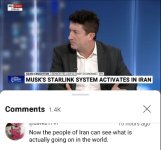

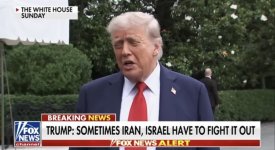
If nuclear negotiations fail and conflict arises with the United States, Iran will strike American bases in the region, Defence Minister Aziz Nasirzadeh said on Wednesday, days ahead of a planned “sixth” round of Iran-U.S. nuclear talks.

Donald Trump revealed Monday that Iran wants to negotiate, as their conflict with Israel grows. However, the U.S. president said, “They should have done that before… They had 60 days, and on the 61st day, I said, ‘We don’t have a deal.’”
‘Should have done that before’: Trump says Iran wants to negotiate as conflict with Israel grows — Global News
Donald Trump revealed Monday that Iran wants to negotiate, as their conflict with Israel grows. However, the U.S. president said, “They should have done that before… They had 60 days, and on the 61st day, I said, 'We don’t have a deal.'”
Ever since the Tehran-backed Hamas attacked Israel on October 7, 2023, Khamenei's regional influence has been weakening as Israel has pounded Iran's proxies - from Hamas in Gaza to Hezbollah in Lebanon, the Houthis in Yemen and militias in Iraq. And Iran's close ally, Syria's autocratic president Bashar al-Assad, has been ousted.

 apple.news
After the surprise Israeli attack on Friday morning, Iran has carried out retaliatory missile strikes on Israeli cities, focusing on the most populated areas between Tel Aviv and the port of Haifa.
apple.news
After the surprise Israeli attack on Friday morning, Iran has carried out retaliatory missile strikes on Israeli cities, focusing on the most populated areas between Tel Aviv and the port of Haifa.

 apple.news
Both sides have targeted each other’s oil and gas facilities, increasing the threat of environmental disaster, and explosions were reported on Monday near oil refineries in southern Tehran.
apple.news
Both sides have targeted each other’s oil and gas facilities, increasing the threat of environmental disaster, and explosions were reported on Monday near oil refineries in southern Tehran.
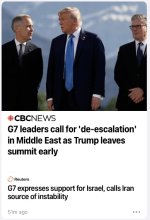
Earlier, in a joint phone call the French German and British foreign ministers urged Iran’s foreign minister, Abbas Araghchi, not to escalate the conflict by attacking the US or other regional players.
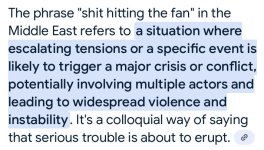

 apple.news
Netanyahu did not start this war. Israel was the victim of a brutal terrorist attack on Oct. 7, 2023, when thousands of Iranian-backed Hamas terrorists stormed southern Israel, brutally raping and slaughtering 1,200 people, mostly innocent civilians, and took over 250 hostages.
apple.news
Netanyahu did not start this war. Israel was the victim of a brutal terrorist attack on Oct. 7, 2023, when thousands of Iranian-backed Hamas terrorists stormed southern Israel, brutally raping and slaughtering 1,200 people, mostly innocent civilians, and took over 250 hostages.
Israel was then attacked by Hezbollah and the Houthis, which are also Iranian proxies. And last year, Tehran turned the long-simmering cold war between the two countries into a hot one when it launched a direct assault against Israel for the first time in history.

 apple.news
apple.news
Iran has vowed to retaliate against the U.S., too, while Trump has warned: “If we are attacked in any way, shape, or form by Iran, the full strength and might of the U.S. Armed Forces will come down on you at levels never seen before.”

 apple.news
Iran’s Foreign Minister Abbas Araghchi said Iran has “solid evidence” that the U.S. provided support for Israel’s attacks. Iran’s Foreign Ministry said in a statement that the attacks “could not have been carried out without coordination with and approval of the United States,” adding that the U.S. will be “held responsible for the dangerous consequences of Israel’s adventurism.”
apple.news
Iran’s Foreign Minister Abbas Araghchi said Iran has “solid evidence” that the U.S. provided support for Israel’s attacks. Iran’s Foreign Ministry said in a statement that the attacks “could not have been carried out without coordination with and approval of the United States,” adding that the U.S. will be “held responsible for the dangerous consequences of Israel’s adventurism.”

 apple.news
apple.news

Iranian supreme leader Khamenei has been implacable opponent of US and Israel — Reuters
Ayatollah Ali Khamenei has spent almost four decades as Shi'ite Iran's supreme leader building a regional power to rival the Sunni states across the Gulf and implacably hostile to the U.S. and Israel - while crushing repeated unrest at home.
Jesse Kline: The Globe and Mail dismisses threat from Iran to bash Israel — National Post
It is disingenuous to claim there is 'no looming nuclear-weapons threat from Iran'

Earlier, in a joint phone call the French German and British foreign ministers urged Iran’s foreign minister, Abbas Araghchi, not to escalate the conflict by attacking the US or other regional players.

Iran-Israel ceasefire offer has been made, says Macron, as Trump exits G7 summit early — Guardian US
US president denies he was leaving the summit to pursue a ceasefire, promising something ‘much bigger’
Israel was then attacked by Hezbollah and the Houthis, which are also Iranian proxies. And last year, Tehran turned the long-simmering cold war between the two countries into a hot one when it launched a direct assault against Israel for the first time in history.
Trump says everyone should immediately evacuate Tehran — Reuters
President Donald Trump on Monday urged everyone to immediately evacuate Tehran, and reiterated that Iran should have signed a nuclear deal with the United States.
Trump has emphasized finding a diplomatic solution to the conflict, touting his self-professed ability to broker peace, but Iran and Israel have so far shrugged off international calls for deescalation as both sides launched new attacks early Monday.….& less than a week later, here we are…
Iran has vowed to retaliate against the U.S., too, while Trump has warned: “If we are attacked in any way, shape, or form by Iran, the full strength and might of the U.S. Armed Forces will come down on you at levels never seen before.”
Another sticking point in the talks has been Iran's missile programme (purely for civilian purposes, etc…). Ballistic missiles form an important part of Iran's arsenal, but that’s not relevant to the nuclear programme, honestly honest, etc…
How Involved Was the U.S. in Israel’s Attack on Iran? — TIME
Reports suggest the U.S. may have played a greater role than has officially been admitted.
The Middle Eastern allies that the Iranian regime has nurtured and backed — Hamas in Gaza, the Houthis in Yemen, Hezbollah in Lebanon and Bashar Assad in Syria — serve as warnings of Khamenei's own potential fate.If nuclear negotiations fail and conflict arises with the United States, Iran will strike American bases in the region, Defence Minister Aziz Nasirzadeh said on Wednesday, days ahead of a planned “sixth” round of Iran-U.S. nuclear talks.
Why the fight with Israel could be the last for Iran's Supreme Leader — Toronto Star
Israel's targeted strikes have killed key generals and top nuclear scientists, in addition to dozens of reported civilian casualties.

No, Ron.
The phrase "shit hitting the fan" in the Middle East means it's Tuesday. Or possibly Thursday. Or whatever they named the days of the week seven thousand fucking years ago.
The phrase "shit hitting the fan" in the Middle East means it's Tuesday. Or possibly Thursday. Or whatever they named the days of the week seven thousand fucking years ago.
You sure it’s seven thousand years ago? Someone will argue with you about that date.No, Ron.
The phrase "shit hitting the fan" in the Middle East means it's Tuesday. Or possibly Thursday. Or whatever they named the days of the week seven thousand fucking years ago.
The sad part is, you're right. It's a lead-pipe cinch some anal-retentive. . . contributor. . . will do just that.You sure it’s seven thousand years ago? Someone will argue with you about that date.
The Houthis, which have been launching attacks against Israel in support of Palestinians in Gaza, said on Sunday that they targeted Israel in coordination with Iran, the first time an Iran-aligned group has publicly announced joint cooperation on attacks with Tehran.
Well, if Justin & Jagmeet could come out’a the closet, so can the Houthis & Iran. “We’re Here! Death To Israel & the Great Satan! Get Use To It!” Good for them.

 apple.news
A member of Yemen's Iran-aligned Houthi movement said on Al Jazeera Mubasher TV on Tuesday that the group will intervene to support Iran against Israel like it did in support of Palestinians in Gaza.
apple.news
A member of Yemen's Iran-aligned Houthi movement said on Al Jazeera Mubasher TV on Tuesday that the group will intervene to support Iran against Israel like it did in support of Palestinians in Gaza.
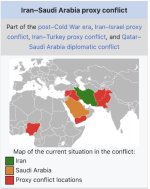
I wonder…what Saudi Arabia will do? If Iran is weakened or distracted, will they role in and just mop up the Houthis without overly concerning themselves about Iran?
Well, if Justin & Jagmeet could come out’a the closet, so can the Houthis & Iran. “We’re Here! Death To Israel & the Great Satan! Get Use To It!” Good for them.
Mohammed al-Bukhaiti, a member of the Houthi movement's political bureau, also reiterated to Al Jazeera Mubasher TV that the group is coordinating with Tehran during its ongoing military escalation with Israel."Certainly all roads of responsibility lead back to Iran," House Intelligence Committee Chairman Mike Turner told BBC News, also linking the country to attacks by Yemen's Iran-backed Houthi movement against ships in the Red Sea and Gulf of Aden.
Houthi official says group will intervene to support Iran against Israel — Reuters
A member of Yemen's Iran-aligned Houthi movement said on Al Jazeera Mubasher TV on Tuesday that the group will intervene to support Iran against Israel like it did in support of Palestinians in Gaza.

I wonder…what Saudi Arabia will do? If Iran is weakened or distracted, will they role in and just mop up the Houthis without overly concerning themselves about Iran?
A WhatsApp spokesperson told TIME on Wednesday morning that the Meta-owned messaging platform is concerned about the reports coming from Iranian state television.
“We’re concerned these false reports will be an excuse for our services to be blocked at a time when people need them the most,” the emailed statement read. “All of the messages you send to family and friends on WhatsApp are end-to-end encrypted. We do not track your precise location, we don’t keep logs of who everyone is messaging, and we do not track the personal messages people are sending one another. We do not provide bulk information to any government.”
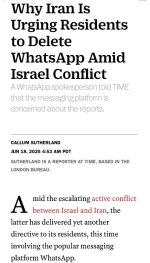
WhatsApp's publicly-shared information purports that its “end-to-end encryption” effectively “locks” chats between individuals, and that no one, including WhatsApp, can access those messages.

 apple.news
A number of social media and messaging apps are banned or heavily restricted in Iran, including Instagram, Telegram, and X, but millions of Iranians still access the sites via VPNs.
apple.news
A number of social media and messaging apps are banned or heavily restricted in Iran, including Instagram, Telegram, and X, but millions of Iranians still access the sites via VPNs.
In 2022, WhatsApp and Google Play were banned by the Iranian government during nationwide protests after the death of 22-year-old Mahsa Amini in police custody. Iran restored access to WhatsApp and Google Play in December 2024.
“We’re concerned these false reports will be an excuse for our services to be blocked at a time when people need them the most,” the emailed statement read. “All of the messages you send to family and friends on WhatsApp are end-to-end encrypted. We do not track your precise location, we don’t keep logs of who everyone is messaging, and we do not track the personal messages people are sending one another. We do not provide bulk information to any government.”

WhatsApp's publicly-shared information purports that its “end-to-end encryption” effectively “locks” chats between individuals, and that no one, including WhatsApp, can access those messages.
Why Iran Is Telling Residents to Delete WhatsApp Now — TIME
A WhatsApp spokesperson told TIME that the messaging platform is concerned about the reports.
In 2022, WhatsApp and Google Play were banned by the Iranian government during nationwide protests after the death of 22-year-old Mahsa Amini in police custody. Iran restored access to WhatsApp and Google Play in December 2024.
Amateurs. A TRUE fascist identifies resentments among a good-sized minority, and energizes them by promising REVENGE! For this, open and uncensored communications are essential.
Donald Trump said he had not decided whether or not to take his country into Israel’s new war, as Iran’s supreme leader said the US would face “irreparable damage” if it deployed its military to attack.
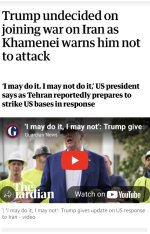
Tehran was preparing missiles and other equipment to strike US bases in the region if Washington joined the war, the New York Times reported, citing US intelligence officials.
Hours later, Trump said Iranian officials had reached out to request a meeting and proposed a visit to the White House.
He told reporters on the White House lawn that he felt “it’s very late to be talking” but he had not yet made a final decision about entering the war. “I may do it, I may not do it. I mean, nobody knows what I’m going to do,” he said. I wonder if that includes Trump himself?

 apple.news
apple.news

Tehran was preparing missiles and other equipment to strike US bases in the region if Washington joined the war, the New York Times reported, citing US intelligence officials.
Hours later, Trump said Iranian officials had reached out to request a meeting and proposed a visit to the White House.
He told reporters on the White House lawn that he felt “it’s very late to be talking” but he had not yet made a final decision about entering the war. “I may do it, I may not do it. I mean, nobody knows what I’m going to do,” he said. I wonder if that includes Trump himself?
Trump undecided on joining war on Iran as Khamenei warns him not to attack — Guardian US
‘I may do it, I may not do it,’ US president says as Tehran reportedly prepares to strike US bases in response
Iran’s supreme leader, Ayatollah Ali Khamenei, said Wednesday in a post on X that his country does not fear President Donald Trump’s threats and “absurd rhetoric.”
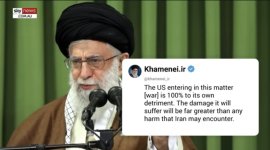
In a television address, he vowed that Iran “Will not surrender and that they’ll fight on the beaches, they’ll fight with your bitches, through rain or sleet or hail something something”…& said any U.S. military intervention in the conflict would bring “irreparable damage.”
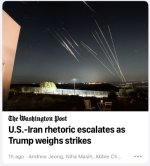 Trump is weighing whether to strike Iran, and the Pentagon has built up U.S. military forces in the Middle East in recent days. Trump told reporters Wednesday he had not come to a decision: “I may do it, I may not do it,” he said. Israel and Iran continued to trade fire on Wednesday, the sixth day of the direct conflict, etc…
Trump is weighing whether to strike Iran, and the Pentagon has built up U.S. military forces in the Middle East in recent days. Trump told reporters Wednesday he had not come to a decision: “I may do it, I may not do it,” he said. Israel and Iran continued to trade fire on Wednesday, the sixth day of the direct conflict, etc…

 apple.news
apple.news
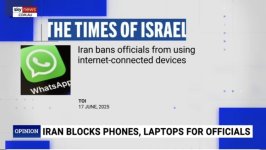

(YouTube & Houthis Vow To Fight, Hamas Backs Iran's "Legitimate Right" As US Gets Ready To Join Israel's War)
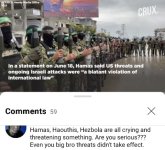

In a television address, he vowed that Iran “Will not surrender and that they’ll fight on the beaches, they’ll fight with your bitches, through rain or sleet or hail something something”…& said any U.S. military intervention in the conflict would bring “irreparable damage.”
 Trump is weighing whether to strike Iran, and the Pentagon has built up U.S. military forces in the Middle East in recent days. Trump told reporters Wednesday he had not come to a decision: “I may do it, I may not do it,” he said. Israel and Iran continued to trade fire on Wednesday, the sixth day of the direct conflict, etc…
Trump is weighing whether to strike Iran, and the Pentagon has built up U.S. military forces in the Middle East in recent days. Trump told reporters Wednesday he had not come to a decision: “I may do it, I may not do it,” he said. Israel and Iran continued to trade fire on Wednesday, the sixth day of the direct conflict, etc…Iranian strike hits key hospital in southern Israel, IDF says — The Washington Post
Iran’s supreme leader, Ayatollah Ali Khamenei, said his country does not fear President Donald Trump’s threats and “absurd rhetoric.”



Iran’s supreme leader, Ayatollah Ali Khamenei, said Wednesday in a post on X that his country does not fear President Donald Trump’s threats and “absurd rhetoric.”

What are the IRGC and the Quds Force?
Iran’s IRGC and Quds Force are a military threat that endangers the Middle East and beyond.Watch to learn more.
YouTube & What are the IRGC and the Quds Force?In a television address, he vowed that Iran “Will not surrender and that they’ll fight on the beaches, they’ll fight with your bitches, through rain or sleet or hail something something”…& said any U.S. military intervention in the conflict would bring “irreparable damage.”
What are the IRGC and the Quds Force? Goyim put on earth to serve the Chosen just like you and I.YouTube & What are the IRGC and the Quds Force?